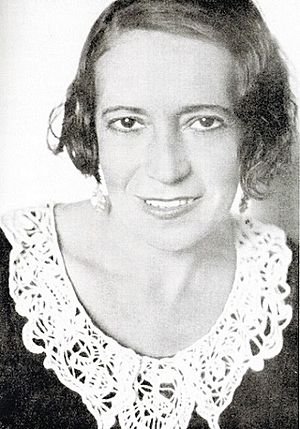Aurora Bertrana facts for kids
Aurora Bertrana i Salazar (born October 29, 1892, in Girona – died September 3, 1974, in Berga, Barcelona) was a talented Catalan cellist and writer. She was famous for her exciting stories and novels, often about faraway places. Aurora lived in many different countries, including Tahiti, Morocco, Switzerland, and France. Her life story is told in her detailed memoirs, which combine Memòries fins al 1935 (published in 1973) and Memòries del 1935 al retorn a Catalunya (published in 1975).
Contents
Aurora Bertrana's Early Life
Aurora was born in Girona in 1892. Her father was the well-known writer, Prudenci Bertrana. After finishing school, Aurora really wanted to be a writer herself. However, her father didn't agree. Instead, he sent her to study the cello.
Becoming a Musician
Aurora first learned cello from Tomás Sobrequés, the best cello teacher in Girona. Later, she moved to Barcelona and earned money by playing the cello in a women's trio at nightclubs. In 1923, she continued her music studies in Geneva, Switzerland. There, she played in the Jazz Women ensemble at the Hotel Chamonix. This was one of the very first jazz bands made up only of women!
While in Geneva, Aurora became friends with Lluís Nicolau d'Olwer, who was living in exile. He later encouraged her to start writing. In 1925, during one of her performances, she met Denys Choffat, an electrical engineer, and they got married.
Aurora Bertrana's Writing Career
In 1926, Aurora read a book called Le Mariage de Loti by Pierre Loti. This book inspired her to move to Tahiti, a beautiful island in the Pacific Ocean. Her experiences there led her to write her first book, Paradisos Oceanics. People were very impressed that a woman wrote about the mythical women of Polynesia.
Returning Home and Collaborating
Aurora returned to Catalonia in 1930 and kept writing novels. She also gave talks and wrote for different publications. Even though her father had not wanted her to be a writer at first, they later worked together! They wrote a novel called L'illa perduda (The Lost Island), dividing the chapters between them. This book was full of adventure and romance, typical of stories about the South Seas.
In 1933, Aurora tried to become a politician for the Republican Left of Catalonia party, but she was not elected. She then left politics.
Life During Wartime and Exile
When the Spanish Civil War started in 1936, Aurora went back to Barcelona. She worked as the editor for Companya, a women's magazine for the Catalan party. Her husband, Denys Choffat, went to a different part of Spain, and they became separated. In 1938, Aurora had to leave Spain and live in exile by herself.
In Switzerland, she wrote for newspapers and magazines in Geneva and Lausanne. She wrote in French and Catalan, and also translated books into Castilian Spanish. Her experiences during World War II were captured in her books Camins de somni (Dream Roads), Tres presoners (Three Prisoners), and Entre dos silencis (Between Two Silences).
For a while, she lived in Prada and visited her mother in Andorra. During this time, she met famous people like the cellist Pablo Casals and the linguist Pompeu Fabra. Her novel Vent de grop (1967) was one of the first books to focus on the topic of tourism. In the 1970s, this book was even made into a film starring Joan Manuel Serrat.
Aurora Bertrana's detailed life story can be found in her memoirs: Memòries fins al 1935 (1973) and Memòries del 1935 al retorn a Catalunya (1975).
Aurora Bertrana's Books
The University of Girona has a special online collection of Aurora Bertrana's published and unpublished writings. Here are some of her well-known books:
- Paradisos oceànics, 1930
- Islas de ensueño, 1933
- Peikea, princesa caníbal i altres contes oceànics, 1934
- L'illa perduda (with Prudenci Bertrana), 1935
- El Marroc sensual i fanàtic, 1936
- Edelweiss, 1937
- Fenua Tahiti, 1943
- Camins de somni, 1955
- Tres presoners, 1957
- Entre dos silencis, 1958
- La nimfa d'argila, 1960
- Ovidi i sis narracions més, 1965
- Fracàs, 1966
- Vent de grop, 1967
- La ciutat dels joves: reportatge fantasia, 1971
- Memòries fins al 1935, 1973
- Memòries del 1935 fins al retorn a Catalunya, 1975
See also
 In Spanish: Aurora Bertrana para niños
In Spanish: Aurora Bertrana para niños
 | Delilah Pierce |
 | Gordon Parks |
 | Augusta Savage |
 | Charles Ethan Porter |


